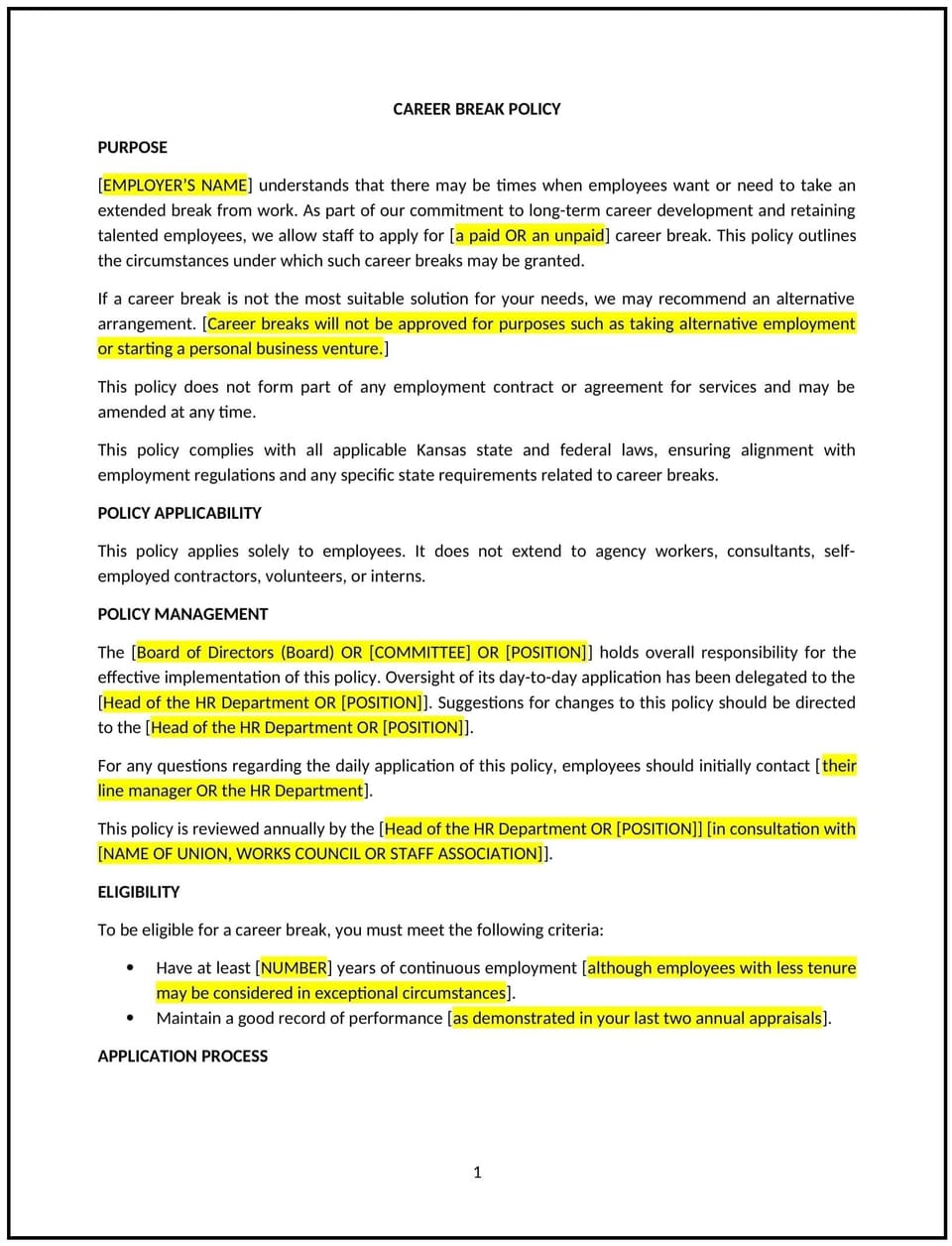Career break policy (Kansas): Free template

Career break policy (Kansas)
A career break policy helps Kansas businesses provide employees with the option to take an extended period of unpaid leave for personal, professional, or educational reasons. This policy outlines eligibility criteria, the application process, and expectations for returning to work while balancing employee needs with business operations.
By implementing this policy, businesses can support employee development, improve retention, and create a structured approach to managing extended leave requests.
How to use this career break policy (Kansas)
- Define eligibility criteria: Businesses should specify which employees qualify for a career break, including factors such as length of service and performance history.
- Establish the request process: Employees should be required to submit a formal request outlining the reason for the break, the intended duration, and any plans for maintaining professional development during their time away.
- Determine the length of career breaks: Businesses should set clear time limits for career breaks, such as a minimum and maximum duration, to ensure operational stability.
- Address job protection considerations: Businesses should clarify whether an employee’s position will be held open or if they will need to reapply for a similar role upon returning.
- Outline benefits and policies during the break: Businesses should specify whether employees will retain any benefits, such as healthcare coverage, or if they will need to make separate arrangements.
- Set return-to-work procedures: Businesses should require employees to notify management in advance of their planned return and outline any reintegration or retraining requirements.
- Review and update regularly: Businesses should periodically assess the policy to reflect workforce needs and industry best practices.
Benefits of using a career break policy (Kansas)
- Supports employee well-being: Provides flexibility for employees managing personal or professional transitions.
- Improves retention: Encourages employees to return after an extended break instead of seeking new employment.
- Enhances workforce planning: Helps businesses manage long-term leave requests in a structured manner.
- Promotes professional development: Allows employees to pursue further education or skill-building opportunities.
- Strengthens employer reputation: Demonstrates a commitment to employee growth and work-life balance.
- Encourages open communication: Establishes a clear process for employees to discuss extended leave options with management.
Tips for using this career break policy (Kansas)
- Communicate policy details clearly: Businesses should ensure employees understand the eligibility requirements and request procedures.
- Balance flexibility with business needs: Businesses should assess operational demands before approving extended leave requests.
- Establish realistic job return expectations: Employees should be informed about whether their previous role will be available upon their return.
- Encourage career planning discussions: Businesses should provide guidance on how employees can maintain skills and stay connected during their break.
- Document all agreements: Businesses should outline expectations in writing to avoid misunderstandings about leave terms and return conditions.
- Review workforce impact regularly: Businesses should evaluate how career breaks affect staffing and update policies accordingly.
Q: Why should Kansas businesses implement a career break policy?
A: Businesses should implement a career break policy to support employee retention, provide structured leave options, and manage long-term absences effectively while maintaining workforce stability.
Q: How long should businesses allow for a career break?
A: Businesses should define the minimum and maximum duration of career breaks based on operational needs. Many businesses allow career breaks ranging from three months to one year.
Q: Can employees request a career break for any reason?
A: Businesses should allow career breaks for a range of reasons, such as education, family care, personal development, or health-related matters. However, approval should depend on business feasibility.
Q: Will employees retain benefits during a career break?
A: Businesses should determine whether employees will retain benefits such as healthcare and retirement plans or if they need to make separate arrangements during their absence.
Q: What happens if an employee wants to return earlier than planned?
A: Businesses should establish procedures for early returns, including notifying management in advance and determining whether a suitable position is available.
Q: Can businesses require employees to reapply for their job after a career break?
A: Businesses should specify whether employees will return to their previous role or if they need to apply for an open position. This depends on company policy and operational needs.
Q: How often should businesses review and update their career break policy?
A: Businesses should review the policy annually or when workforce needs change. Regular updates help ensure the policy remains relevant and practical.
This article contains general legal information and does not contain legal advice. Cobrief is not a law firm or a substitute for an attorney or law firm. The law is complex and changes often. For legal advice, please ask a lawyer.


